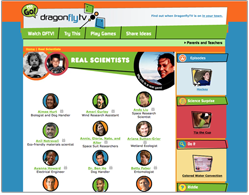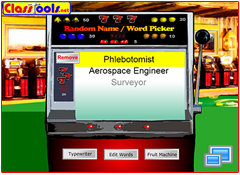
|
|
A Multitude of Media
|
|
Want to introduce your students to professionals at work in every facet of scientific research and innovation? Look no further than the Real Scientists series from PBS Kids and DragonflyTV. Students learn from scientists first hand in these bite-sized videos where scientists explain what they do and why their work is important to our understanding of the world. Learn from nearly 70 different scientists working in fields such as entomology, galactic astronomy, ethnobotany, bioengineering, and a slew of other super cool jobs. After allowing students time to explore the videos, consider what experts might be working in or around your city, perhaps these might even include parents of your students. Invite professionals to visit your class or connect virtually using Skype for the opportunity to learn firsthand what they do. These learning opportunities provide the environment for students to ask questions, challenge their previous knowledge, and consider new possibilities for their futures.
|

|

|
|
|
|

|
Matthew's Tip
of the Month
|
 We celebrate School Library Month, Math Awareness Month, and National Poetry Month in April. Challenge yourself and your class to make this a month of asking big questions and using resources such as those available on TrueFlix to find answers and develop new understandings. Seek ways to combine research, math, and poetry into your practice this month and develop learning opportunities that will open new worlds for your students. Students can explore the wealth of information available through our TrueFlix social studies and science topics, writing their questions in learning journals and recording the answers and specific sources used for reference later. Students can analyze data found within the eBooks and create timelines, charts and graphs, or other data observations in order to articulate information in a new way. You can even challenge your students to synthesize what they learn into a poem based on any number of different poetic forms as a new way to express their learning. No matter how you choose to approach your work with students, making these associations natural and meaningful will allow for a connection to research, math, and poetry students won't soon forget. We celebrate School Library Month, Math Awareness Month, and National Poetry Month in April. Challenge yourself and your class to make this a month of asking big questions and using resources such as those available on TrueFlix to find answers and develop new understandings. Seek ways to combine research, math, and poetry into your practice this month and develop learning opportunities that will open new worlds for your students. Students can explore the wealth of information available through our TrueFlix social studies and science topics, writing their questions in learning journals and recording the answers and specific sources used for reference later. Students can analyze data found within the eBooks and create timelines, charts and graphs, or other data observations in order to articulate information in a new way. You can even challenge your students to synthesize what they learn into a poem based on any number of different poetic forms as a new way to express their learning. No matter how you choose to approach your work with students, making these associations natural and meaningful will allow for a connection to research, math, and poetry students won't soon forget.
|
Matthew Winner
Library Media Specialist & TrueFlix Ambassador
|

|
|
|
|
|

|
|
|
 Think about what you wanted to be when you were younger. What was your answer to the question "What do you want to be when you grow up?" Now think about why you named the job you did. Was it because it's a career path shared by a parent or sibling? Did you take a trip or visit a location that got you thinking about that particular job? Did you see the job featured on a television show, in a magazine, or book? More than likely, you were introduced to that line or work in a way that appealed to you, so much so that you couldn't stop thinking about it. In what ways are we engaging our students to think about how their interests can translate into careers? Take this opportunity to introduce students to unfamiliar lines of work by researching career paths on the CareerZone website. Rather than overwhelm students with choice, "assign" them a career path with JobBot3000 (fictional character made up to engage students and contextualize learning). Use the Fruit Machine to randomly select a job for them. To do so, first enter in a list of jobs you'd like for the students to research. The list might include careers in STEM fields such as an Aerospace Engineer, Phlebotomist, Surveyor, and Biostatisticians. Have students collect data on the job description, associated tasks, skills needed, and work style of the career. Most of the careers also include short videos that provide an overview of the career. Then ask the students to write a speech to JobBot3000 in support of opposition to their job assignment. Do you see yourself thriving in this career because it involves a high degree of math computation, or is that something with which you might struggle? Does the career require more schooling than you anticipated, and are you willing to put in the work? Giving students the chance to articulate their reactions supports public speaking objectives, develops clear and concise responses to prompts, and can maximize the number of careers to which each child is exposed when shared aloud in a group. Think about what you wanted to be when you were younger. What was your answer to the question "What do you want to be when you grow up?" Now think about why you named the job you did. Was it because it's a career path shared by a parent or sibling? Did you take a trip or visit a location that got you thinking about that particular job? Did you see the job featured on a television show, in a magazine, or book? More than likely, you were introduced to that line or work in a way that appealed to you, so much so that you couldn't stop thinking about it. In what ways are we engaging our students to think about how their interests can translate into careers? Take this opportunity to introduce students to unfamiliar lines of work by researching career paths on the CareerZone website. Rather than overwhelm students with choice, "assign" them a career path with JobBot3000 (fictional character made up to engage students and contextualize learning). Use the Fruit Machine to randomly select a job for them. To do so, first enter in a list of jobs you'd like for the students to research. The list might include careers in STEM fields such as an Aerospace Engineer, Phlebotomist, Surveyor, and Biostatisticians. Have students collect data on the job description, associated tasks, skills needed, and work style of the career. Most of the careers also include short videos that provide an overview of the career. Then ask the students to write a speech to JobBot3000 in support of opposition to their job assignment. Do you see yourself thriving in this career because it involves a high degree of math computation, or is that something with which you might struggle? Does the career require more schooling than you anticipated, and are you willing to put in the work? Giving students the chance to articulate their reactions supports public speaking objectives, develops clear and concise responses to prompts, and can maximize the number of careers to which each child is exposed when shared aloud in a group.
|
|
|
|
|

|
|
UPCOMING WEBINAR DATES
|
|
Learn more about getting the most out of TrueFlix by attending one of our monthly online training sessions.
|
Tuesday, May 9, 2017
12:00 to 1:00 pm EST
|

|
|
|
|
|

|
|
We'd Love to Hear From You!
|
|
Have a suggestion for what unit we should cover next? Or have an idea on how we can make this newsletter even better? Whatever it is, we're looking forward to hearing from you.
|

|
|
|
|
|

|
|
e-news Archive
|
Get more tips and tools from our past newsletters
|
|
|
|
|
|
|
|